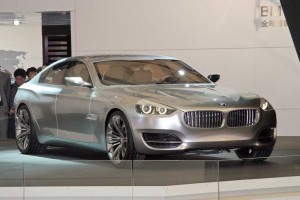
Will BMW abandon Tokyo for China? It used the Shanghai Motor Show to unveil its '07 CS Concept.
BMW has become the latest automaker to abandon the fast-fading Tokyo Motor Show, raising further questions about the future of the once-critical biennial event.
The German maker’s decision to abandon the show, once one of the four major global events it considered a must, was confirmed for TheDetroitBureau.com by communications executive Jan Ehlan.
Rumors had begun to circulate, in recent days, that the Bavarian marque would walk away from the show, which has steadily lost its gloss, in recent years. There are several reasons behind the decline: first, and perhaps foremost, foreign makers have largely given up trying to penetrate the traditionally xenophobic Japanese market, where foreign brands have never achieved a collective quarter of all total new vehicle sales, despite years of trying. In BMW’s case, sources suggested, the automaker has seen its modest share slip, lately, in favor of its German rival, Audi.
The Tokyo show’s organizers have seldom hidden their tendency to play favorites, often putting foreign brands in bad locations or setting them up their news conferences for undesirable timeslots. Yet even the smallest display can cost millions of dollars, a serious consideration in good times and a sheer disaster in the current economy. The Japanese car market has mirrored the slumping U.S., with sales now at their lowest levels since the mid-1970s, and there are few prospects of any serious recovery for years to come.

The Tokyo Motor Show has had a reputation for wild and wacky domestic concepts. Will that be all that's left this year?
TheDetroitBureau.com has learned that a number of makers have formally given notice they will skip the show scheduled for October 2009 at Makuhari Messa, a sprawling convention center an hour’s train ride – and as much as two hour’s driving, in traffic – from central Tokyo. Chrysler’s chief spokeswoman, Lori McTavish has confirmed the ailing automaker will be absent in October, noting, "Under the current challenges and market situation, Chrysler LLC made the decision not to participate in the TMS in 2009 in order to secure limited resources and invest efficiently in the activities necessary to sustain our business. We regret that we will be losing an opportunity to show the company's presence at one of the international auto shows. Chrysler will however, continue to offer Japanese consumers an attractive product portfolio as well as quality services."
Meanwhile, other makers confirming plans to skip the Tokyo show, this year, include General Motors, Volkswagen and Ford, while other foreign makers, such as Kia, are also reportedly considering an exit.
Earlier this year, concerns about declining manufacturer participation led organizers to consider cancelling this year’s Tokyo Motor Show, the first since 2007. So far, however, they’ve continued their plans to stage the event, resting on the anticipated support of Japan’s numerous automakers. Earlier this month, Nissan Motor Co. announced plans to scale back its corporate sponsorship to just four global auto shows during the fiscal year beginning March 31st. Tokyo will be one of those – if the event goes ahead.
Whatever happens this coming October, the event at Makuhari Messe may never regain its once-vital role in the global auto industry. In recent years, manufacturers have been steadily shifting their attention across the South China Sea, emphasizing the alternating auto shows in Beijing and Shanghai.
The Chinese market actually became the world’s largest, early this year, due to the collapse of demand in the U.S., and though that was a temporary aberration, most industry analysts believe it very well might overtake the States on a continuing basis within the next 10 to 15 years. More importantly, in industry eyes, the Chinese market is wide open to foreign players – with the caveat that they create joint ventures with local makers, such as SAIC, the Shanghai-based consortium that is partnering with, among others, both GM and its erstwhile rival, VW.
BMW has used the Chinese shows to unveil some important new products, including the prototype of its upcoming coupe-like sedan, which was first shown in Beijing, two years ago.
Auto Shows, in general, may be in trouble. Click here for more on that story. Then click here to find out why the British Motor Show has been cancelled.
Paul A. Eisenstein, Bureau Chief of TheDetroitBureau.com, contributed to this report.
